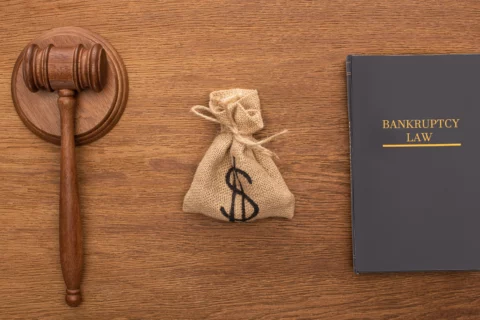What Happens to My Retirement Savings in Bankruptcy in Schaumburg, IL?
Managing Your Retirement Savings Despite Filing For Bankruptcy
When facing financial challenges, the prospect of bankruptcy can be overwhelming, especially when safeguarding assets like your retirement savings. When you are on the brink of bankruptcy, the fear of losing your hard-earned retirement savings can be paralyzing.
Understanding what happens to your retirement savings in bankruptcy is the first step you can take in finding a solution.
Quick Summary:
- Several retirement fund options are available for the public. However, this discussion will focus on two of the most popular ones: IRAs and 401(k) plans.
- Chapter 7 and Chapter 13 bankruptcy have different effects on retirement savings, with unique exemption limits and protection strategies for decision-making.
- Chapter 13 bankruptcy, in particular, safeguards 401(k) assets, allowing retention during a structured repayment plan.
- Different key factors are assessed when choosing between retirement withdrawals or bankruptcy, including legal consequences, tax implications, and future financial security.
- Alternative solutions are explored before resorting to retirement withdrawals or bankruptcy, including a comprehensive financial plan.
In this article, we will explain the complexities surrounding retirement savings in bankruptcy and dispelling the misconceptions surrounding it. Bankruptcy is not the end of your retirement savings. You can think of it as a gateway to a better financial future.
What are the Different Types of Retirement Savings?
Retirement savings come in various forms, each offering unique benefits and considerations. Here are some common types:
- 401(k): Employer-sponsored retirement plans where employees contribute a portion of their salary, often with employer matching.
- IRA (Individual Retirement Account): Personal accounts that individuals can set up, offering tax advantages. Traditional IRAs provide tax-deferred growth, while Roth IRAs offer tax-free withdrawals in retirement.
- 403(b): Similar to a 401(k) but designed for employees of non-profit organizations, schools, and certain governmental entities.
- Pension Plans: Employer-sponsored plans that provide a fixed income in retirement, typically based on salary and years of service.
- Social Security: Government program providing a source of income for retirees, funded through payroll taxes.
- Annuities: Insurance products offering a guaranteed income stream in retirement, often purchased with a lump sum.
- Employee Stock Ownership Plans (ESOPs): Retirement plans allowing employees to become partial company owners through stock ownership.
- Savings Accounts and CDs: Traditional savings accounts or certificates of deposit (CDs) can be part of retirement planning, providing liquidity and security.
- Real Estate Investments: Owning property can be a form of retirement savings, providing potential rental income or appreciation.
- Health Savings Accounts (HSAs): While primarily for healthcare expenses, HSAs can serve as a retirement savings tool, allowing tax-free withdrawals for qualified medical expenses in retirement.
- Rollover IRAs: Accounts where individuals can transfer funds from employer-sponsored plans like 401(k)s when changing jobs and maintaining tax-advantaged status.
Understanding the variety of retirement savings options allows individuals to tailor their approach based on goals, risk tolerance, and financial circumstances.
How Does Bankruptcy Affect My Retirement Savings?
Bankruptcy can have significant implications for your retirement savings, and the impact largely depends on the type of bankruptcy you file—Chapter 7 or Chapter 13.
Here’s an overview of how bankruptcy may affect your retirement savings:
Chapter 7 Bankruptcy
- Liquidation of Assets: Chapter 7 involves liquidating non-exempt assets to pay off creditors. Retirement savings in qualified accounts like 401(k)s and IRAs are often protected up to a specific limit. Federal law provides exemptions, shielding a substantial portion of your retirement savings in bankruptcy.
- Exemption Limits: Understanding the exemption limits specific to your jurisdiction is crucial since they can vary. The law aims to preserve retirement savings to ensure individuals have a financial safety net in their later years. As of 2022, a combined value of $1,512,350 or less can be protected in different IRA plans.
- Non-Exempt Retirement Savings: Any retirement savings beyond the exemption limits may be subject to liquidation. However, seeking legal advice and strategic planning can help maximize the protection of your retirement assets.
Chapter 13 Bankruptcy
- Repayment Plan: Chapter 13 involves creating a repayment plan to settle debts over a specified period, typically three to five years. During this time, you retain your assets, including retirement savings.
- Protected Assets: Retirement savings are generally considered protected assets in Chapter 13 bankruptcy. Your repayment plan is based on your income and disposable income, not the value of your assets.
- Financial Reorganization: Chapter 13 allows for financial reorganization without liquidating assets. It provides a structured approach to resolving debts while safeguarding essential assets, including retirement savings.
While bankruptcy can pose challenges, it doesn’t necessarily mean losing your retirement savings. The type of bankruptcy, exemption planning, and legal counsel play pivotal roles in safeguarding your financial future.
Can I Use my 401(k) Plan in Chapter 13 Bankruptcy?
In Chapter 13 bankruptcy, your 401(k) plan is generally protected, allowing you to retain your retirement savings while working through a structured repayment plan.
Here’s how you can navigate the use of your 401(k) plan in Chapter 13:
Retaining 401(k) Assets
- Protected Asset: Chapter 13 is designed to help individuals reorganize their finances without liquidating assets. Your 401(k) plan is typically considered a protected asset, and you can retain ownership of the funds within the account.
- No Forced Liquidation: Unlike Chapter 7 bankruptcy, where non-exempt assets may be liquidated to repay creditors, Chapter 13 focuses on creating a manageable repayment plan based on your income. There is generally no forced liquidation of 401(k) assets.
Incorporating 401(k) in Repayment Plan
- Disposable Income Calculation: In Chapter 13, your repayment plan is based on your disposable income or the amount left after necessary living expenses. Your 401(k) contributions are not typically considered disposable income for the plan.
- Contributions During the Plan: You can continue contributing to your 401(k) plan during the Chapter 13 repayment period. The funds in the account are not used to determine your disposable income available for creditors.
Should I Withdraw From My Retirement Savings or File for Bankruptcy?
Deciding whether to withdraw from your retirement savings or file for bankruptcy is a complex decision that depends on various factors. Here are some considerations to help you weigh your options:
- Legal Consequences: Bankruptcy has legal consequences, which will appear on your credit report. However, it can also provide a fresh start and protection from creditors.
- Tax Implications: Withdrawing from retirement savings may have tax implications. Early withdrawals from certain accounts, like IRAs, may incur penalties and taxes. Consult with a tax advisor to understand the tax consequences.
- Future Financial Security: Consider the impact on your future financial security. Withdrawing from retirement savings diminishes the funds available for your retirement, potentially jeopardizing your long-term financial well-being.
- Alternative Solutions: Explore alternative solutions before tapping into retirement savings or filing for bankruptcy. Negotiating with creditors, debt consolidation, or seeking financial counseling are potential alternatives.
Consider your long-term financial goals. A comprehensive financial plan, including strategies for rebuilding credit and saving for retirement, can help guide your decision.
Work With Our Experienced Bankruptcy Attorney Today!
Facing bankruptcy is undoubtedly a challenging journey, but understanding the complexities of how it impacts your retirement savings is crucial. Knowing what happens to retirement savings in bankruptcy helps secure your financial future.
It’s advisable to seek professional guidance to fully understand the implications of every bankruptcy option and develop a strategy that aligns with your long-term goals. Our bankruptcy lawyers at Cutler & Associates, Ltd., serving Schaumburg, IL, will help you make informed decisions about your financial future. Give us a call today and get a free consultation!


